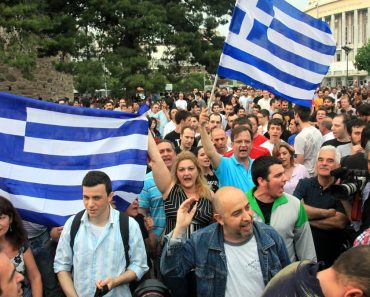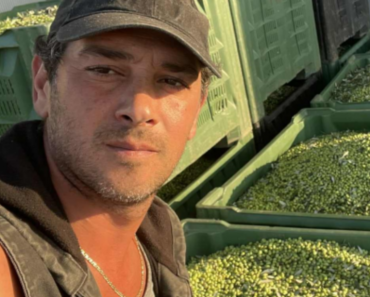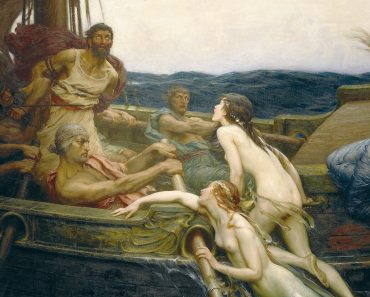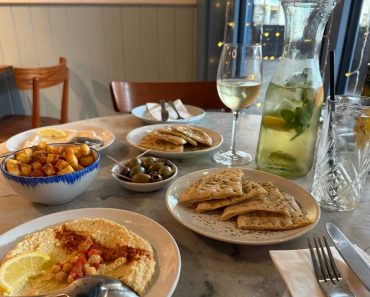Food writer and journalist Anastasia Miari’s yiayia (grandmother in Greek) was “not impressed” with her new cookbook, Mediterranea. “She never learned to read or write, so was like, ‘What do I do with this?’ She was just looking for her photo in it,” says Miari with a laugh. “But as soon as you walk into her house [in Corfu], she’s got my three books on the back of her sofa and my wedding photo in the middle of them all – the biggest achievement for her in life. So I know she’s proud of me.”
She’s not the only grandmother who’ll be looking for their photo in Mediterranea though, a book that preserves the recipes of grandmothers across the Mediterranean basin. These formidable, fascinating women and their food are captured by photographer Marco Argüello. Drenched in sunlight, the pages are patterned with ornate kitchen tiles, antique table cloths, hardworking two ring gas burners, alongside the beautiful wrinkles of these grandmothers who have racked up years of life experience alongside a repertoire of dishes.
Miari has been cooking with grandmothers for 10 years. Her last cookbook, yiayia, focused on Greek grandmothers, including her own. In Mediterranea she meets matriarchs from the “usual suspects” like France, Italy, Greece and Spain but “wanted to show that the Mediterranean is so much more than just pasta, olive oil and good tomatoes. It is also the Balkans, the Levant, North Africa.”
Miari was born in Corfu and moved to London aged 11. She lived in the UK until she was 28 and then returned to Greece six years ago to raise a family. “My life has changed completely. Now I’m picking fruits at the market, able to actually squeeze tomatoes and smell them and know whether they’re going to taste of something or not, instead of having things in plastic [from the supermarket],” she says, explaining that eating in the Med is about “more than just fuelling your body. It’s about communion, conviviality and sharing a passion for food.”
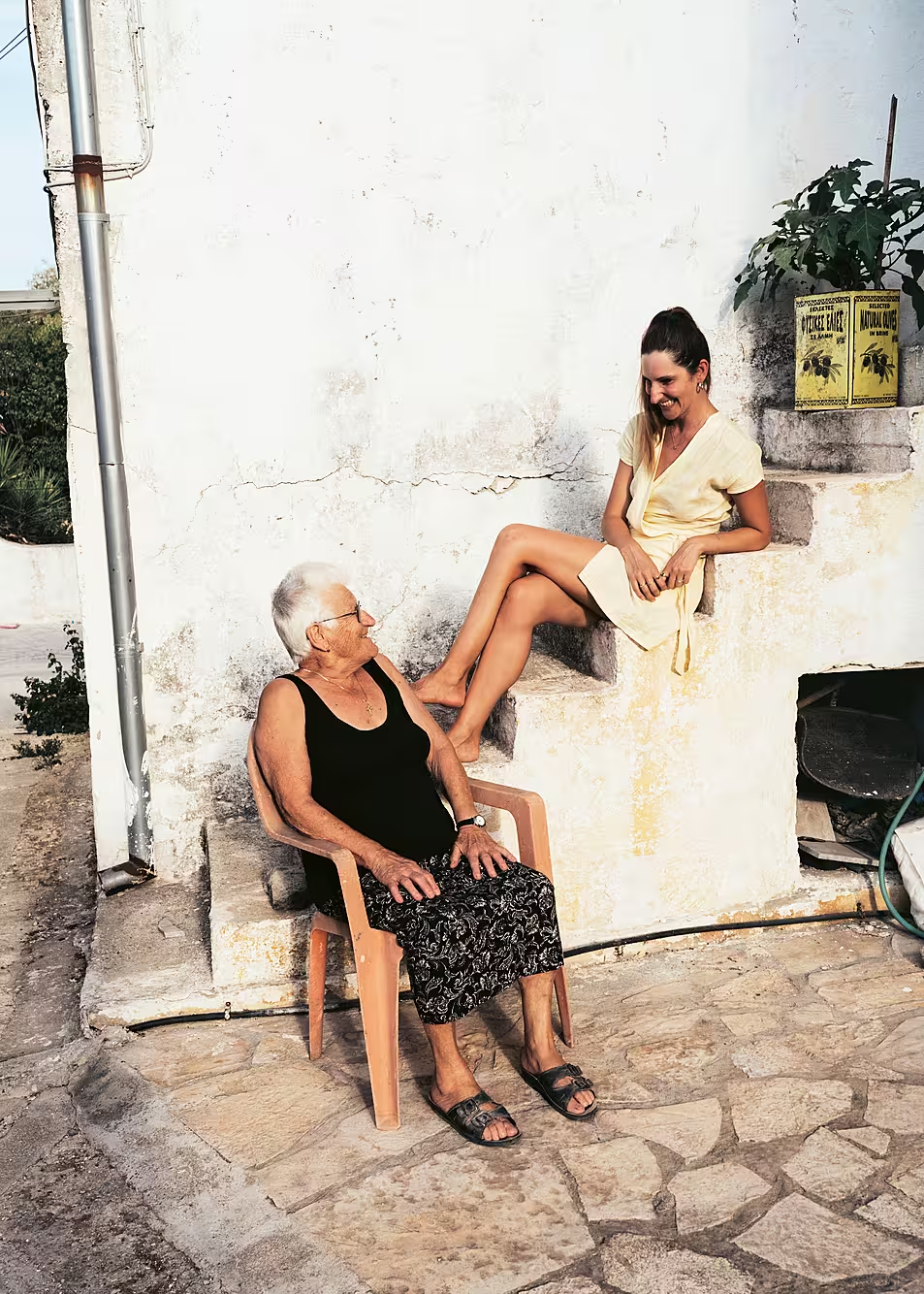
The recipes – from a Greek-style risotto to a Tunisian carrot dip – are largely vegetarian (“There’s no one better than grannies to teach us about zero waste, not eating too much meat and doing what you can with what you’ve got,”) and Miari hopes they’ll become staples. “No one cooks like these women,” she says. “If you’ve been making the same dish day in, day out for 70 years, you’re going to have perfected it.”
The simplicity and cost-effectiveness of this way of cooking – while still being delicious – is a blueprint Miari believes we can all benefit from. “I need and want to cook like a Mediterranean nonna because I don’t have time to look up recipes on Instagram. I want a repertoire of 15 amazing dishes my family will eat forever and I’ll always go back to, and we’re losing that in the dross of online content,” she argues.
Also, these recipes are supremely achievable. “I’m not a trained chef, I just want dinner to be easy and taste amazing, with minimum effort,” says Miari. “Some of these women raised families of 10, and then their kids had kids, and they were raising them as well. They had to learn to do things quickly and find shortcuts.”
It’s also a matter of legacy. The invaluable knowledge and “intangible heritage” contained within these recipes would be lost if Miari wasn’t wrangling scales into these grandmothers’ kitchens. “They’re always quite surprised when I show up with weighing scales and measuring jugs – the response is either, ‘No way,’ or they laugh at me,” she says wryly.
For Miari, recording her yiayia’s recipes was “very special and important” for passing them down to her daughters (she’s pregnant with her second), but more far reaching than that, in a world where history has often been written by men, her goal is to “share the stories of these ordinary women, because they’re extraordinary.” So the recipes are accompanied by snippets of the nonnas’ lives, the good and the traumatic, be it tough childhoods, difficult marriages, lost children, absent parents or missed opportunities. “When you’re cooking, you have fewer inhibitions, your hands are busy, and there’s a sense of nostalgia with the food you’re cooking,” says Miari, of how these conversations happen. “The stories are always quite profound. It is moving, I’ve sat and cried with them.”

And this is the crux, beyond the food, Miari is interested in what these women can tell us about living and how “the Mediterranean lifestyle is a better template” for doing it. “Who better to show us how life is best lived than these women who have lived really long, full and happy lives?” she asks.
It’s also an opportunity to reflect on women’s rights. “Many of these women didn’t really have a choice. They had to, for financial reasons, or because of pressure from society, get married and they had no option to have a career of their own,” says Miari. “It’s important to recognise that that threat hasn’t just gone away. Look at Afghanistan, or Iran. When I spoke to the grandmothers in Turkey, they thought the future would be so much brighter for their daughters and granddaughters, but they’re seeing things move backwards.”

She says that alongside the happiness and the joy in food, “the biggest learning I have from all of these women is that life is very long. People say life is short, but your life can take so many paths. It’s important to not waste that time, but it’s also important not to sweat the small stuff.”
She hopes this collection of stories and dishes is a chance for people to “inject a little bit of Mediterranean living into their own lives. It’s not just about eating well, it’s about taking the time to just not do anything, to have a nap or to go for a swim or to go for a walk in nature,” she says, adding with a laugh: “I want everyone to live like a Mediterranean nonna – or, at least a couple of times a week!”

Mediterranea by Anastasia Miari with photographs by Marco Argüello, is published by Quadrille. Available July 31st.


